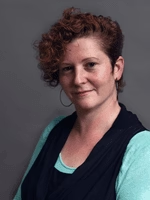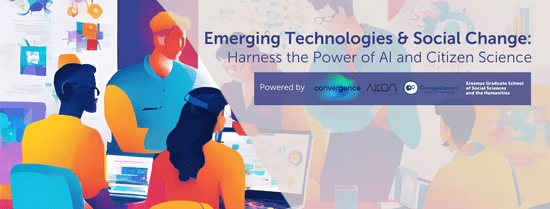Introduction
Key terms: qualitative and quantitative research, generating impact with your PhD project, transdisciplinary collaboration, citizen science approaches, AI applications, data visualization tools, introductory course, relevant for postdocs and for student in any PhD phase
ECTS: 2
Number of sessions: 2
Hours per session: 8 and 4
This course aims to empower PhD candidates and postdocs to expand the societal impact of their research by working across disciplines with AI, design approaches, human expertise, and citizen science. Participants will explore how they can translate their expertise into innovative solutions that make a tangible difference beyond academia.
Participants will collaborate in a designathon format to prototype transdisciplinary hubs for AI-assisted research. Cancer research will be taken as an initial example, but participants will also reflect on strategies with which they can amplify the broader societal relevance of their own projects.
The course is offered by AICON, which is a movement at the EUR that focuses on trans-sectoral co-creation and making AI more democratic, better understandable, and accessible to all.
Practical information
- Start date
- Wednesday 1 Apr 2026
- Price
- Free and paid
- Micro Credential
- No
Who is this for?
No prior expertise in AI or citizen science is required. Curiosity and openness to interdisciplinary collaboration are sufficient.
The course is relevant for PhD candidates and postdocs from all disciplines and in all phases of their trajectory.
Since the course takes cancer research as an example, it is primarily relevant for researchers in health. However, the course will also help participants from other research fields from the humanities and social sciences with reflecting on increasing the societal impact of their own research with the help of AI and citizen science.
Relations with other courses
This course complements other EGSH courses about impact and designing research. While these other courses focus on general frameworks for societal engagement, research design and/or interdisciplinarity, this course provides a practical and playful experience based on the designathon format.
It is well-suited as a follow-up for students who wish to apply theoretical insights in a real-world collaborative setting, or as a stand-alone course for those new to societal impact and AI.
Sessions and preparations
Session 1: Designathon: Exploring and empowering a real-world case study
Collaborate with researchers, AI experts, designers, and healthcare partners to co-create a transdisciplinary hub where patients, players, and scientists contribute to advancing cancer research.
Preparations: short pre-readings on AI and citizen science.
Session 2: Amplifying the social impact of your research
Reflect on the societal values and outcomes your own research can foster. Map your research context and develop an impact plan.
Preparations: bring a short description of your own research project.
Start date
Session 1 (Designathon including lunch):
April 1 (Wednesday) 2026 | 09.00-17.00 hrs | Offline (Erasmus Education Lab, ground floor Polak building)
Session 2 (Co-creation session):
April 15 (Wednesday) 2026 | 13.00-17.00 hrs | Offline (Erasmus Education Lab, ground floor Polak building)
Instructor
 Shailoh PhillipsShailoh Phillips is an artist, writer, community organizer, and action researcher. For over 15 years, she has worked on transdisciplinary projects that create dynamic, participatory spaces addressing urgent social and ecological challenges. Her practice emphasizes playful resistance, identifying pressure points to confront social inequalities and environmental crises. She fosters imaginative responses and cultivates our capacity to perceive, respond, and act in the face of catastrophes. As a fractal systems thinker, she explores how large-scale collective issues appear in daily life and how internal transformation can drive systemic change. Trained in cultural anthropology, cultural analysis, and philosophy, she holds an MA in Education in Arts (Piet Zwart Institute). Her previous roles include coordinating the Media Lab at the Rijksmuseum, contributing to the Tools for Action collective, co-founding Salwa Foundation to support migrant artists and teaching at art academies across the Netherlands. Currently, she is pursuing a PhD in narrative psychology and palliative care (University of Twente, Artez, UMC), focusing on art-based learning sessions for individuals with incurable cancer.
Shailoh PhillipsShailoh Phillips is an artist, writer, community organizer, and action researcher. For over 15 years, she has worked on transdisciplinary projects that create dynamic, participatory spaces addressing urgent social and ecological challenges. Her practice emphasizes playful resistance, identifying pressure points to confront social inequalities and environmental crises. She fosters imaginative responses and cultivates our capacity to perceive, respond, and act in the face of catastrophes. As a fractal systems thinker, she explores how large-scale collective issues appear in daily life and how internal transformation can drive systemic change. Trained in cultural anthropology, cultural analysis, and philosophy, she holds an MA in Education in Arts (Piet Zwart Institute). Her previous roles include coordinating the Media Lab at the Rijksmuseum, contributing to the Tools for Action collective, co-founding Salwa Foundation to support migrant artists and teaching at art academies across the Netherlands. Currently, she is pursuing a PhD in narrative psychology and palliative care (University of Twente, Artez, UMC), focusing on art-based learning sessions for individuals with incurable cancer.
Contact
- Enrolment-related questions: enrolment@egsh.eur.nl
- Course-related questions: annemiek@teamkallenbach.com
- Telephone: +31 (0)10 4082607 (Graduate School)
Facts & Figures
- Start date
- Wednesday 1 Apr 2026
- Price
- free for PhD candidates and postdocs of the Graduate School and the Convergence*
- 575,- for PhD candidates and postdocs of other universities and institutes
- consult our enrolment policy for more information
(within the AI, Data & Digitalisation theme)
- Tax
- Not applicable
- Micro Credential
- No
- Course code
- Designathon Ai in transdisciplinary research
- Instruction language
- English
- Location
Designathon 1 April 2026:
Erasmus Education Lab
Polak building | ground floorCo-creation session 15 April 2026:
Erasmus Education Lab
Polak building | ground floor
